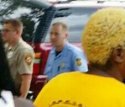K_Z
Verified Anesthetist
- Joined
- Nov 8, 2010
- Messages
- 6,657
- Reaction score
- 63,876
Ok, I saw an episode of Brain Games regarding expert intuition of law enforcement personnel some time ago that came to mind recently regarding Officer Wilson.
Scientists have discovered a second type called expert intuition, which is the sort that comes from special training and experience. Studies of nurses in the 1980s, for example, revealed that those who had been in the profession for a long time tended to make better judgments and to do it more quickly. In a study published in the journal Science in 2011, researchers examined the brains of expert Japanese chess players and found that they utilized different regions of their brains while playing than amateurs did. In particular, they had more activity in the precuneus area of the parietal lobe, a region associated with visualizing images and episodic memory. When they needed to come up quickly with a move, activity surged in the caudate nucleus, where goal-directed behavior is rooted. The researchers believe that the experts intuitive skill resulted from a circuit that they had forged between the two regions from many years of training.
http://braingames.nationalgeographic.com/episode/20/
Here's part of the clip about LE expert intuition.
https://m.youtube.com/watch?list=PLivjPDlt6ApQhuYe9r7EVeWMGXJWAZsNw&v=kZN4zocRnN4
In essence, the episode says expert intuition allows LE to more quickly/accurately observe and act on information than laypeople, in determining a suspect as an example. Makes sense to me, and reinforces why laws allow for what the officer reasonably believes. Not only did the "for no reason" witnesses lack all the information Darren had at the moment he fired, but they also would not be as skilled at evaluating the level of risk or need as an officer.
Moo
PS There's more about LE intuition via google.
Reminds me of "ways of knowing" and "theory of knowledge".
http://www.theoryofknowledge.net/ways-of-knowing/
http://en.wikipedia.org/wiki/Theory_of_knowledge_(IB_course)
In healthcare, especially intensive care, and OR environments, rapid assessment, rapid decision making, and action are essential skills. It's recognizing the early and subtle signs that your patient is spiraling, and headed for a crash, but intervening and PREVENTING the crash. (And there are no awards for that-- ideally no one even notices. That's true skill.) But as I tell my anesthesia students, simply "having" Plan A, Plan B, and Plan C in your back pocket, is no guarantee of success. The REAL skill comes with being able to rapidly determine WHEN to abandon Plan A, and go to Plan B, or Plan C. That's when you save lives.
The million dollar question is, how do you teach what typically comes with substantial experience? Simulation, drills, algorithms, and repetition have been the answer for healthcare. The military, airline industry, and law enforcement have also substantially incorporated high level simulation.
Another great book on this topic, highly recommended:
http://www.amazon.com/The-Checklist-Manifesto-Things-Right/dp/0312430000




